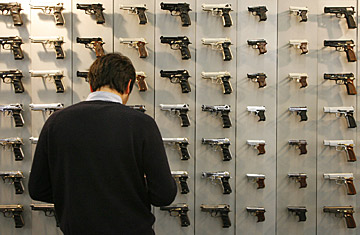
A man looks at pistols on display at the weapons trade fair in the southern German city of Nuremberg.
Europeans might once have viewed massacres at educational institutions as a uniquely American scourge, but they no longer have that luxury: Friday found Germany still mourning the 16 victims of Wednesday's carnage in Winnenden, while Scotland marked the 13th anniversary of Europe's first mass school shooting, the bloodbath at Dunblane in which 16 grade-school students and their teacher were mowed down by a lone gunman. Clearly, Europe has a problem to which there's no simple solution.
"When you compare us to countries with enormous gun ownership like the U.S., it's obvious we're less vulnerable to gun violence," says Christophe Soullez, chief of France's National Observatory on Delinquency. "But less vulnerable doesn't mean fully protected. Guns are more difficult to get here, but they can be and are obtained — and, at times, used." (See pictures of gun crime in the U.S.)
The killing spree by 17-year-old Tim Kretschmer in Winnenden provided another reminder that while increasingly stiff gun-control legislation has slowed the incidence of gun violence, it has failed to halt the phenomenon. Since Dunblane in 1996, there have been 11 school massacres across Europe, which left at least 70 people dead and 80 wounded. And most of them followed a similar pattern.
"When a lone individual snaps and a gun is available, the potential for violence is just horrible," says Marc Trévidic, an investigating magistrate in France's special antiterrorism division. "Usually that involves someone grabbing their father's hunting rifle and shooting until they're overwhelmed. But when automatic weapons are involved, it's a different story. Fortunately, those are far harder to obtain."
Harder, but not impossible.
Kretschmer used a semiautomatic pistol he obtained at home — the only one of his father's 15 guns that was not kept under lock and key. Seven years earlier, expelled student Robert Steinhause had killed 18 people at a school in the German town of Erfurt, using weapons obtained legally. That massacre had provoked Germany to considerably tighten its gun legislation to the point that it is now among the most stringent in Europe. That was still not enough to prevent Kretschmer's killing spree.
Other European countries have also stiffened gun laws over the past decade, and many are going even further now. Unlike the U.S., whose courts recognize a constitutional right to bear arms, European nations tend to view gun ownership as a responsibility that must be both justified and earned. Finland, which saw two school massacres in 2007 and 2008, last week banned the ownership of firearms by anyone under 20. Portugal is moving to increase penalties for the use of guns in crimes, while Denmark is doubling the sentence for unauthorized possession of arms.
Even Switzerland, whose militia defense system permits people to keep automatic weapons in their homes (there are an estimated 1.5 million nationwide), is planning a referendum on rescinding that right. People in favor of a ban say prolific gun ownership has fueled a recent spate of suicides and murders, including the killing of a family of four near Geneva this month in a suspected domestic incident.
Though it may pale in comparison to America's 88.8 registered weapons per hundred people, the rate of gun ownership in Europe is higher than one might imagine. In Switzerland there are 45.7 guns per hundred people; in Finland, 45.3; France's 31.2 is a little higher than Germany's 30.3. The U.K., which banned most gun ownership after two massacres, has a rate of 6.2 registered guns per 100 people.
"Statistically, France is lucky," says Aaron Karp, professor of political science at Virginia's Old Dominion University and a senior consultant with the Small Arms Survey in Switzerland. "As for why Germany and Finland have suffered more mass gun violence, I don't think anyone knows."
What may be more instructive, Karp counters, is how stringent gun-control laws have helped reduce rates of gun violence elsewhere. Following the 1996 Port Arthur massacre that killed 35 people, Australia banned all semiautomatic rifles and shotguns and passed strict laws requiring trigger locks and secure storage of guns in homes. "That is the next step for Europe," Karp says, noting that such controls could have prevented Wednesday's killings. "Making that move will be easier in Europe than in the U.S., because no one in Europe dares pretend they own a gun for their own defense."
Experts believe that tightening controls on Europe's legally owned guns may be more important than curbing the flow of illegal weapons into Europe. "You need connections and money to buy black-market guns, and crazed people who decide to go kill usually don't have the time or information to procure illegal arms in time," says Trévidic. Even when gang members and other delinquents acquire weapons, Soullez says, they're careful about using them. "Up to now, using guns against each other — and most of all, against police — has been that last barrier of violence they haven't wanted to jump," Soullez notes. "As we've seen, guns are most dangerous in the hands of normal people pushed over the boundaries of sanity, because then we have no idea when or how they'll use them."
